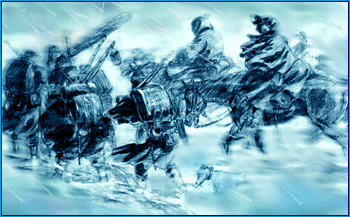 |
|
 |
|
|---|---|---|---|
Following a difficult winter march Brig. Gen. Alpheus Williams had arrived at Hancock, Maryland on January 8, 1862. In command of the 3rd Brigade of Bank's division, he found himself on the extreme right of the Army of the Potomac where the Potomac River exits the slopes of the Allegany Mountains. His poorly provisioned command consisted of six infantry regiments which included the 2nd Massachusetts, 5th Connecticut, 19th New York, 28th New York, and 46th Pennsylvania, a company of artillery (Co. A, Rhode Island Battery) and two companies of cavalry, nearly 5,000 men. Opposing him in the hills to the south were the forces of a still relatively unknown general, Thomas "Stonewall" Jackson. It was a bitterly cold winter and a pushy northern press was calling for action. Williams, who was intimately aware of the impossibility of such a move describes the situation in the following letter.
I arrived in Hancock, Maryland in early April. It is a small but busy village. Behind the main street of the town lays the dried up Chesapeake & Ohio canal and, about fifty feet beyond, the Potomac River flows shallow and wide. The forested bluffs on the other side once marked the beginning of Rebel territory where General Williams first came eye to eye with the rebels. His immediate problem, however, was not the enemy, but the Union troops occupying Hancock! Art work by Lowell Boileau developed from image by Alfred Waud. All quotes, unless otherwise indicated, are from letters written by General Williams to various family members. These were obtained from original manuscript letters of Alpheus Williams which reside in the Burton Historical Collection of the Detroit Public Library and "From the Cannon's Mouth, the Civil War letters of General Alpheus S. Williams" edited by Milo Quaife, Wayne State University Press and the Detroit Historical Society, 1959. |
|||
